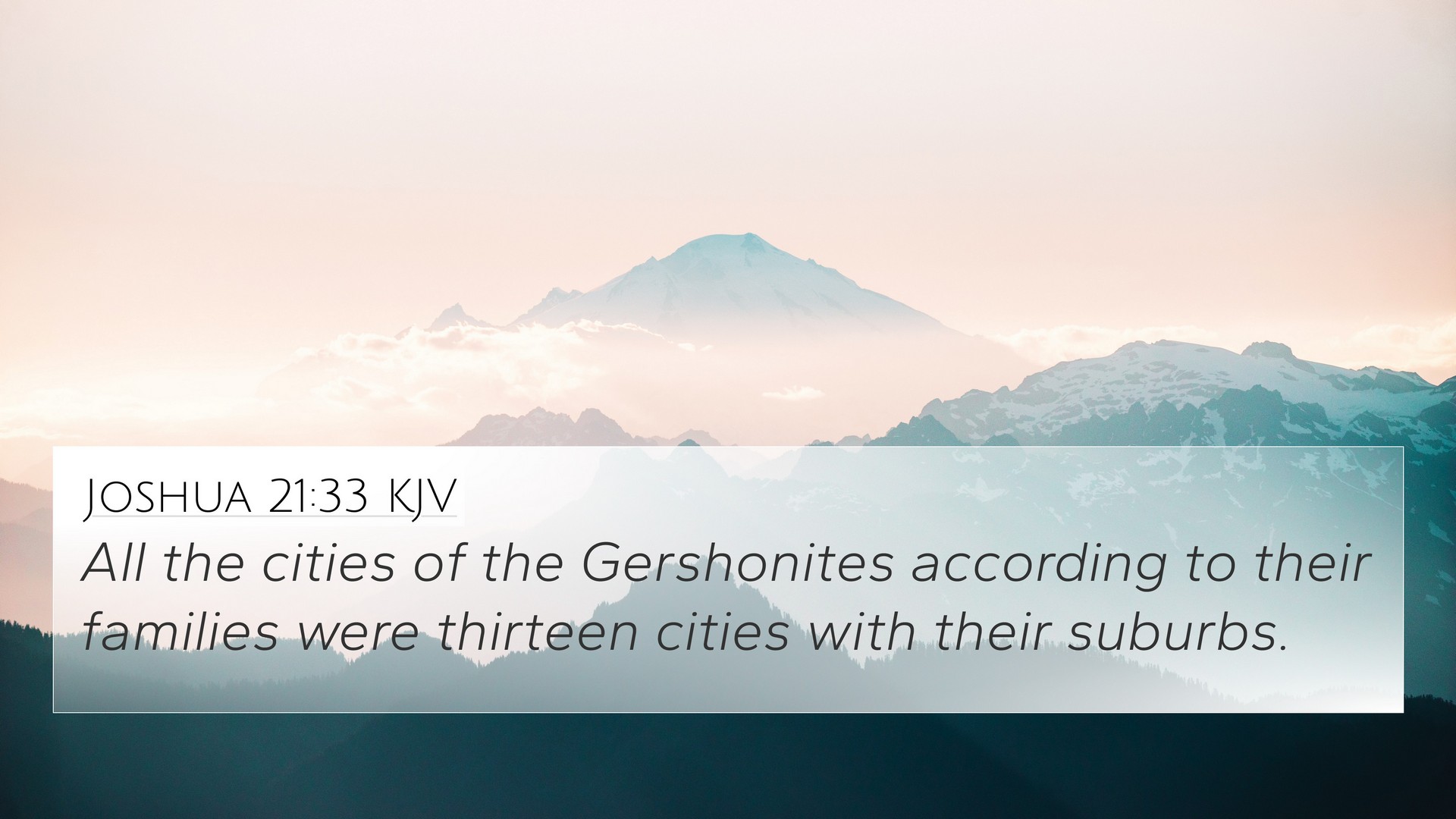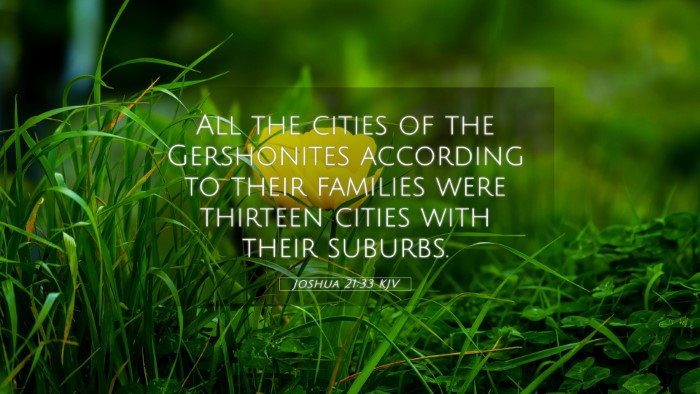Bible Verse Meaning: Joshua 21:33
Verse: "And out of the half tribe of Manasseh, the cities which were appointed were twelve cities." (Joshua 21:33)
Overview
The verse describes the allocation of cities to the half tribe of Manasseh as part of the broader distribution of land among the tribes of Israel. This passage highlights God’s provision for His people through the establishment of cities of refuge and dwelling places.
Interpretation and Commentary Insights
-
Matthew Henry:
Henry emphasizes the systematic approach by which God provided for the Israelites. The division of cities provides security and a means of habitation. Each tribe receiving cities underscores God’s faithfulness in keeping His promises to Israel.
-
Albert Barnes:
Barnes points out that the cities of the Levites, including those given to the half tribe of Manasseh, were selected for their strategic importance. They served not only as residences but also as centers for teaching the law and maintaining the worship of God, connecting tightly with the responsibilities assigned to the Levitical priests.
-
Adam Clarke:
Clarke discusses the significance of the number twelve. He correlates this with the twelve tribes of Israel, suggesting a completeness and divine order in the division of the land. The cities granted to Manasseh reflect God’s providential care in meeting the needs of His people.
Thematic Connections
This verse illustrates several overarching themes found throughout Scripture:
- God’s Faithfulness: Just as He promised to provide for the tribes, God consistently fulfills His covenant promises (Deuteronomy 31:6).
- The Importance of Community: The cities represent not just physical places but the necessity of community among God’s chosen people (Hebrews 10:24-25).
- God’s Order: The systematic division of land reflects divine order and organization, which is critical to understanding God’s ways (1 Corinthians 14:40).
Cross-References
This verse can be cross-referenced with the following scriptures for deeper understanding:
- Joshua 14:4 - The significance of the half tribe of Manasseh within the greater narrative of Israel.
- Numbers 35:6-7 - Cities of refuge, emphasizing the roles of cities in the lives of the Israelites.
- Deuteronomy 33:13-17 - The blessing of Joseph as a prophetic foreshadowing of Manasseh's endowment.
- 1 Chronicles 5:23-26 - The historical implications of the tribe of Manasseh and their territories.
- Psalms 78:68-69 - Reference to God selecting Zion and building His sanctuary, paralleling how cities were significant in Israel's history.
- Hebrews 7:14 - Discussion of the priesthood through Levi, reflecting the spiritual leadership corresponding to this land allocation.
- John 14:2 - The theme of dwelling places is further exemplified in Christ’s teaching about the Father's house.
Understanding Connections between Bible Verses
The allocation depicted in Joshua 21:33 is a part of a larger framework of themes pertinent to cross-referencing Biblical texts:
-
Theological Significance:
Examining the nature of God’s provision provides insight into His character and promises.
-
Historical Context:
Understanding the broader historical and cultural backdrop of the Israelites’ settlement helps to unpack the relevance of this verse.
-
Scriptural Patterns:
Many verses within the Old and New Testaments reflect themes of land, inheritance, and God’s promises; connecting them enhances our theological understanding.
Tools for Bible Cross-Referencing
For those looking to explore cross-references in Scripture, several tools and methods can be employed:
- Use a Bible Concordance to locate terms and see where they appear throughout Scripture.
- Utilize a Bible Cross-reference Guide that indicates related verses for in-depth study.
- Engage in Cross-reference Bible study methods to draw out thematic connections.
- Leverage Bible reference resources for a comprehensive look at similar themes.
Conclusion
Joshua 21:33 is not merely a historical note; it represents God’s methodical provision and faithfulness toward humankind. Through inter-Biblical dialogues, scholars and laypersons alike can glean insights on God's covenant relationship with His people, emphasizing the interconnectedness of Scripture. In studying this verse, one becomes acutely aware of the divine order and the importance of community that God establishes.


